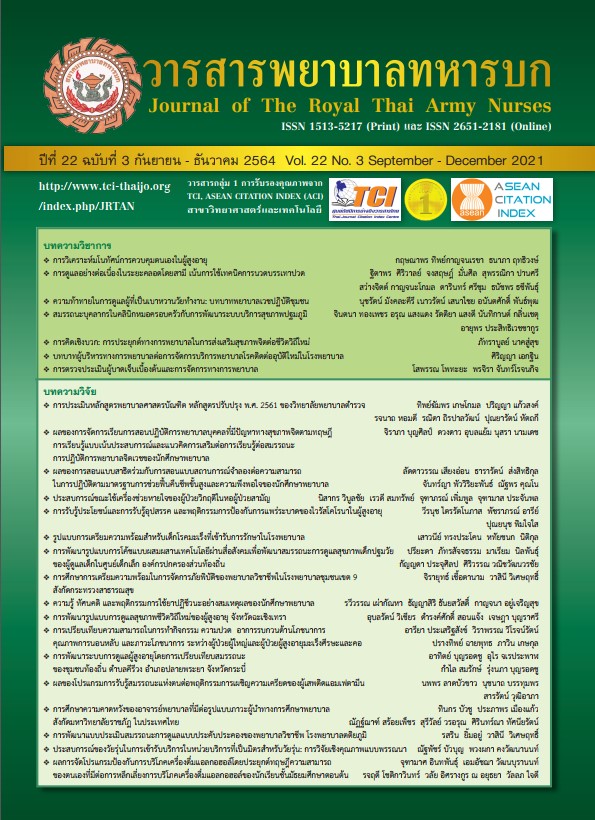A Study of Expectations of Nursing Teachers towards Leadership Model in Nursing Education under Rajabhat University in Thailand
Keywords:
Leadership, Nursing education leader, Rajabhat universityAbstract
The objective of this descriptive research was to study nurse teachers’ expectation toward nursing education leadership model of Rajabhat Universities. The sample consisted of 79 nursing teachers of Rajabhat Universities using simple random sampling. The instrument was a questionnaire using rating scale 5 levels. Content validity were at 0.67-1.00 of index of Congruence and reliability were at 0.993 of Cronbach’s Alpha Coefficient. Data were analyzed using descriptive statistics.
The results of the research were as follows: Nursing teachers have expectations toward nursing education leadership model. Most of them have expectations on ethical leadership at a good level ( = 4.32, SD = 0.84), followed by visionary leadership at a good level (
= 4.30, SD = 0.80), inspirational leadership at a good level (
= 4.24, SD = 0.84), professional leadership, leadership with regard to individuality, technology leadership, and transformational leadership, respectively. From the research results, the administrators of the Faculty of Nursing under Rajabhat University can use it as a guideline for self-development according to the perceptions and expectations of the personnel in the organization to have the leadership in the administration of the nursing education institute of Rajabhat University.
Downloads
References
Chamchoy S. School management in digital era. Bangkok: Chulalongkorn University Press; 2018. (in Thai)
Sanrattana W. Leadership: theory and contemporary perspectives of leadership. Bangkok: Tipvisut Co.,Ltd; 2014. (in Thai)
Vanaudomdechachai S. Strategic management. Bangkok: Threelada Co.,Ltd; 2013. (in Thai)
Boonyoung N. Nursing strategic planning. Thai Journal of Nursing Council. 2010; 25(2): 18-27. (in Thai)
Kidjawan N. Design thinking process: new perspective in thai healthcare system. Thai Journal of Nursing Council. 2018; 33(1): 5-14. (in Thai)
Noparoojjinda S, Chinatangul S. Leadership factors for nursing college administrators the jurisdiction of the ministry of public health. Journal of Educational Administration, Silpakorn University. 2011; 1(2): 14-27. (in Thai)
Chaichompoo S. Ethical leadership in school administration. Journal of Educational Administration Burapha University. 2014; 8(2): 1-15. (in Thai)
Karnjanapun R. Ethical leadership development for manager. Ph. D. in Social Sciences Journal. 2017; 7(3): 16-25. (in Thai)
Poochada A, et al. The development of visionary leadership indicators of school administrators under the northeast primary educational service area. Journal of Educational Administration, Khon Kaen University. 2015; 11(1): 57-67. (in Thai)
Teanprapakun P. Leadership of school administrators in education 4.0. Veridian E-Journal, Silpakorn University. 2018; 11(2): 1994-2013. (in Thai)
Chathamalo T. Strategy leadership of university executive. Journal of Buddhamagga. 2019; 4(1): 48-56. (in Thai)
Damsab Y, Buddhicheewin N, Dhammasaccakarn W. Leadership development of school administrators in the context of a multicultural society. Journal of Education Studies. 2019; 41 (Supplement 1): 272-293. (in Thai)
Franklin PD, Montgomery KL, Dorr P, Trandel D. Building maryland’s health care leadership capacity: the nurse leadership institute at the university of maryland school of nursing. Nursing Outlook. 2020; 68(5): 657-670.
Joseph ML, et al. The nurse leader’s role: a conduit for professional identity formation and sustainability. Nurse Leader. 2021; 19(1): 27-32.
Cleavenger DJ, Munyon TP. It’s how you frame it: transformation leadership and the meaning of work. Business Horizons. 2013; 56(3): 351-360.
Auareesuksakun A, Chuntuk T. Transformational leadership: changing challenges to achieve organization sustainability. Veridian E-Journal, Silpakorn University. 2016; 9(1): 845-860. (in Thai)
Buachu T, Buachu T. The status of digital leadership of education management administrators. Journal of Educational Studies. 2019; 13(2): 285-294. (in Thai)
Aonlaoo C, Bangwiset S, Sanpao G, Aonlaoo S. Digital era leadership for educational administration. College of Asian Scholars Journal. 2020; 10(1): 108-119. (in Thai)
Buachu T, Soiphet N, Muangkaew P, Chomphunit P, Chayathab S. Transformative learning: apply to nursing administration and management subject. Journal of The Royal Thai Army Nurses. 2020; 21(3): 20-8. (in Thai)
Giddens J. Transformational leadership: what every nursing dean should know. Journal of Professional Nursing. 2018; 34(2): 117-121.
Downloads
Published
How to Cite
Issue
Section
License
บทความหรือข้อคิดเห็นใดใดที่ปรากฏในวารสารพยาบาลทหารบกเป็นวรรณกรรมของผู้เขียน ซึ่งบรรณาธิการหรือสมาคมพยาบาลทหารบก ไม่จำเป็นต้องเห็นด้วย
บทความที่ได้รับการตีพิมพ์เป็นลิขสิทธิ์ของวารสารพยาบาลทหารบก
The ideas and opinions expressed in the Journal of The Royal Thai Army Nurses are those of the authors and not necessarily those
of the editor or Royal Thai Army Nurses Association.






